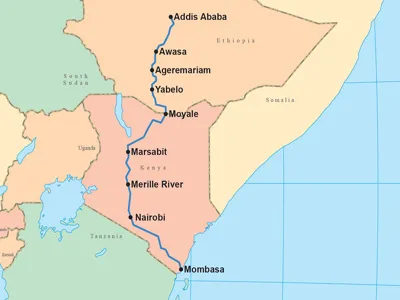Odebrecht has been awarded a concession for Brazil’s important BR-163 federal highway route. The 851km section of highway runs through Mato Grosso state and the deal is worth some US$2 billion, according to a report by Business News Americas. As part of its contract, Odebrecht will have to widen a 454km stretch of the route within five years and is also required to build nine new toll booths.
November 29, 2013
Read time: 2 mins
RSSEthiopia is set to benefit economically from investment in a number of new key road links totalling over US$1 billion.
The east African nation’s 218km Modjo-Hassan highway is expected to cost US$720 million to construct. The highway will be constructed in two stages. The first section of the route will stretch 93km from Modjo to Zeway and is expected to cost $350 million to complete. The second section of the highway will be 125km long and link Zeway with Hewassa and this stretch is estimated to cost $370 million to build. However, funding for the highway project has yet to be finalised. The Ethiopia Roads Authority (ERA) is looking to obtain a portion of the project’s funding from the China Exim Bank and the2332 World Bank, as well as a $350 million tranche from the South Korean Government and the 1586 African Development Bank.
Two Chinese firms are building another new road connection. The 133km road will run from Mille to Kombolcha, through Bati. Shandong Highway is working on a 73km stretch of the route from Milla to Burka, while Zhongmei Engineering has the Deal for the 60km stretch of road from Burka to Kombolcha. The project is being carried out for the Ethiopian Government and is being handled by the Ethiopian Roads Authority (ERA). Indian firm International Consultants & Technocrats (ICT) has a US$1.38 million consultancy contract to oversee the project through a joint venture with local firm Civil Works Consulting Engineers.
A third key road link will benefit transport links in and around Ethiopia’s capital, Addis Ababa. The city authorities are planning work on the road connecting the Inter-city bus terminal with the Lideta Church, and the road between St George Church and 18 Mazoria. The work was due to begin this month and will take a year to complete. The authorities say they will require a budget of some US$397 million to build up to 113km of roads with asphalt surfaces in the 2013/2014 period.
The east African nation’s 218km Modjo-Hassan highway is expected to cost US$720 million to construct. The highway will be constructed in two stages. The first section of the route will stretch 93km from Modjo to Zeway and is expected to cost $350 million to complete. The second section of the highway will be 125km long and link Zeway with Hewassa and this stretch is estimated to cost $370 million to build. However, funding for the highway project has yet to be finalised. The Ethiopia Roads Authority (ERA) is looking to obtain a portion of the project’s funding from the China Exim Bank and the
Two Chinese firms are building another new road connection. The 133km road will run from Mille to Kombolcha, through Bati. Shandong Highway is working on a 73km stretch of the route from Milla to Burka, while Zhongmei Engineering has the Deal for the 60km stretch of road from Burka to Kombolcha. The project is being carried out for the Ethiopian Government and is being handled by the Ethiopian Roads Authority (ERA). Indian firm International Consultants & Technocrats (ICT) has a US$1.38 million consultancy contract to oversee the project through a joint venture with local firm Civil Works Consulting Engineers.
A third key road link will benefit transport links in and around Ethiopia’s capital, Addis Ababa. The city authorities are planning work on the road connecting the Inter-city bus terminal with the Lideta Church, and the road between St George Church and 18 Mazoria. The work was due to begin this month and will take a year to complete. The authorities say they will require a budget of some US$397 million to build up to 113km of roads with asphalt surfaces in the 2013/2014 period.






